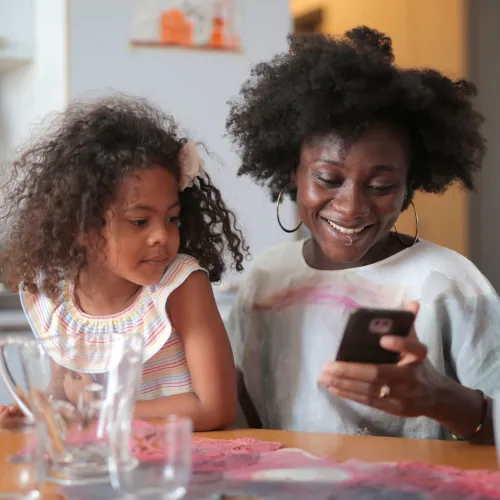Helping Kids Cope With Big Transitions

Significant life transitions are not always easy to face. Starting a new job, changing schools, or moving to a new home are all big events that might feel intimidating at first, but once you settle into your new circumstance that you're presented with, it starts feeling less scary and more comfortable. It's that time of transitioning from something old into something new that can create anxiety and stress that amplifies the gravity of the change taking place.
When faced with a big transition, adults and children alike are prone to experience these kinds of feelings. While it's normal for any person to need support from others during these times, children sometimes need a little extra support to help them handle whatever is going on around them.
If your child is going through a time of transformation and change, be sure that they are receiving the care they need during stressful moments. Consider these four strategies for helping kids cope with big transitions.
Walk Through It Together
When kids are making a transition to a new house or new school, it can make all the difference if they are a bit familiar with what they're getting into before it jumping right into it. Help them know what to expect by walking them through the precisely what's going to be changing.
If it's a change in their schedule that is giving your child the jitters, take time to go over the new schedule together. This can be common in kids right before a new school year is about to start. If you have the opportunity, bring your kids to their school to actually walk through their schedule. Many schools offer meet-and-greets before the new school year begins so that parents and children can stop by to meet with the teachers and tour the classrooms.
If it's the same school they attended the year before, they may already feel confident about starting another year there. If it's a brand new school, visiting beforehand may prove to change your child's outlook on the first day. Taking a tour of the school with other kids is a great way even to help your child meet a few new friends and get to know some familiar faces before classes begin. Also, consider pairing your school tour with shopping for school supplies. Heading right to the store for notebooks and markers after your visit can help to keep up the positive energy.
While a new school year can be scary, moving into a new home can be just as stressful. Before you move your family to a new place, tour the house before you move in. If a tour isn't an option because others are still living in the home or it's not ready for visitors yet, even driving by it and around the neighborhood may help. This gives your child a chance to visualize where they will be living, whether or not they get to see the inside.
Keep Up the Routine
No matter what your kids are making a transition into, maintaining a daily routine in place helps to ease them into the process. Routines let children know what they can expect to happen each day, from the time they wake up until they go to bed.
Make sure that the routine you set for your kids promotes good health both physically and emotionally. This will include establishing a bedtime that allows for a healthy amount of sleep, regular meal times that include healthy options, and designated homework slots during the school year. Don't forget to carve in time for fun each day, too!
Weekends and holidays may be a bit more relaxed when it comes to keeping the routine, and that is okay. Be sure that your children understand why weekend routines get to be a little looser so that making the transition back to the weekday routine is less painful.
If it's possible to keep their routine similar to what it was before, that can help curb confusion and stress in your child. However, if it must change dramatically due to an entirely new set of circumstances, know that your child can adapt. Kids are resilient and can acclimate to a new schedule, but still make sure you are there to offer your support and motivate them to keep moving forward with confidence.
Seek Out Some Fun
To help make a transition more comfortable for your kids, seek out fun activities that they could get involved in. If you're moving to a new house, keep your eyes open for parks nearby that you see kids playing in. You can take your kids there, and perhaps they'll get to know some of the other kids there.
Also, if your new home has enough outdoor space, consider building a play set in the backyard. This could be something that your kids can look forward to using once you move. It could also be something that your kids would want to invite over friends or neighborhood kids to play with.
If your kids are transitioning to a new school, they may not know many people around them. Talk to your kids about getting involved in one or more school programs. This will be a way for your kids to meet new people who have similar interests with your kids.
Talk About It
In some instances, it might not be a total surprise to you that your child isn't happy about making a transition. The unfamiliar is often scarier than it is exciting, so they might not be taking to the transition very well. Talk to your kids about how they're feeling in regards to the upcoming change, and allow them to share their feelings with you.
Maybe they are nervous to be away from you or their old friends when they are at their new school, or perhaps they are angry that they have to leave their old room for a different one in the new house. Keep a positive attitude about yourself as you have these conversations with your kids. As a parent, if you are confident and enthusiastic about the transition at hand, this will likely rub off on your kids.
There will be ups and downs throughout the transitions like into a new home or a new school, but work to maintain your positive outlook as a way to help encourage your kids to do the same. Starting the conversation might not always be easy, especially if your kids are reluctant to talk about what's bothering them. To help spark a conversation, try reading stories about other kids who are dealing with changes might help your kids to realize that others feel the same way and that it's okay. Here are two reading suggestions that might help start a conversation about transitions with your child.
The Invisible String, by Patrice Karst
This book addresses feelings of separation anxiety, something that many children experience in the midst of a transition that impacts their time with loved ones. In the story, a mother describes to her children that they are all connected by "An Invisible String made of love."
Not This Bear: A First Day of School Story, by Alyssa Satin Capucilli
The title gives you an idea of what this story is about. Bear is about to start his first day of school, but he's not feeling ready to go. After a little encouragement, this young bear finds the courage to give school a try.
Coping with change can be tough for people of any age, but unlike many adults, kids don't always understand why transitions take place and how to handle it. As a parent, patiently work with your child and offer the support they need to move ahead into whatever it is they are about to face. Walk together through what is about to change, and get a routine in place as soon as the transition takes place. Don't forget to look for new ways to have fun to lighten the stress of a scary move. Finally, remember to encourage your child to talk about what they're feeling in order to let out their emotions. Even if it seems scary today, with healthy support, your child can overcome and succeed in the new circumstances with which they are presented.





